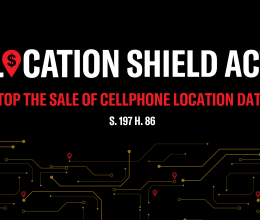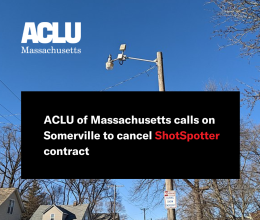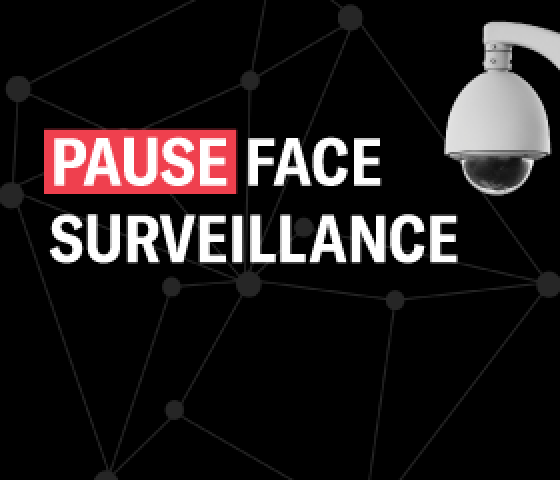The FBI is tracking our faces in secret. We’re suing.
By Kade Crockford, director of the Technology for Liberty Project at the ACLU of Massachusetts
Many of us wear masks on Halloween for fun. But what about a world in which we have to wear a mask every single day to preserve our privacy from the government’s oppressive eye?
Face recognition surveillance technology has already made that frightening world a reality in Hong Kong, and it’s quickly becoming a scary possibility in the United States.
The FBI is currently collecting data about our faces, irises, walking patterns, and voices, permitting the government to pervasively identify, track, and monitor us. The agency can match or request a match of our faces against at least 640 million images of adults living in the U.S. And it is reportedly piloting Amazon’s flawed face recognition surveillance technology.
Face and other biometric surveillance technologies can enable undetectable, persistent, and suspicionless surveillance on an unprecedented scale. When placed in the hands of the FBI — an unaccountable, deregulated, secretive intelligence agency with an unresolved history of anti-Black racism — there is even more reason for alarm. And when that agency stonewalls our requests for information about how its agents are tracking and monitoring our faces, we should all be concerned.
That’s why today we’re asking a federal court to intervene and order the FBI and related agencies to turn over all records concerning their use of face recognition technology.
The FBI’s troubling political policing practices underscore the urgent need for transparency. Under the leadership of the agency’s patriarch — the disgraced J. Edgar Hoover — the FBI obsessively spied on left-wing, Indigenous rights, anti-war, and Black power activists across the country. Hoover infamously tried to blackmail Martin Luther King, Jr., encouraging the civil rights leader to kill himself to avoid the shame Hoover’s leaks to journalists would bring to him and his family. The FBI was also involved in the 1969 killing of Fred Hampton, a brilliant Chicago leader in the Black Panther Party who was assassinated by Chicago Police while he lay asleep in his bed next to his pregnant girlfriend.
While Hoover’s reign may be history, the FBI’s campaign against domestic dissent is not.
Since at least 2010, the FBI has monitored civil society groups, including racial justice movements, Occupy Wall Street, environmentalists, Palestinian solidarity activists, Abolish ICE protesters, and Cuba and Iran normalization proponents. In recent years, the FBI has wasted considerable resources to spy on Black activists, who the agency labeled “Black Identity Extremists” to justify even more surveillance of the Black Lives Matter movement and other fights for racial justice. The agency has also investigated climate justice activists including 350.org and the Standing Rock water protectors under the banner of protecting national security.
Because of the FBI’s secrecy, little is known about how the agency is supercharging its surveillance activities with face recognition technology. But what little is known from public reporting, the FBI’s own admissions to Congress, and independent tests of the technology gives ample reason to be concerned.
For instance, the FBI recently claimed to Congress that the agency does not need to demonstrate probable cause of criminal activity before using its face surveillance technology on us. FBI witnesses at a recent hearing also could not confirm whether the agency is meeting its constitutional obligations to inform criminal defendants when the agency has used the tech to identify them. The failure to inform people when face recognition technology is used against them in a criminal case, or the failure to turn over robust information about the technology’s error rates, source code, and algorithmic training data, robs defendants of their due process rights to a fair trial.
This lack of transparency would be frightening enough if the technology worked. But it doesn’t: Numerous studies have shown face surveillance technology is prone to significant racial and gender bias. One peer-reviewed study from MIT found that face recognition technology can misclassify the faces of dark skinned women up to 35 percent of the time. Another study found that so-called “emotion recognition” software identified Black men as more angry and contemptuous than their white peers. Other researchers have found that face surveillance algorithms discriminate against transgender and gender nonconforming people. When our freedoms and rights are on the line, one false match is too many.
Of course, even in the highly unlikely event that face recognition technology were to become 100 percent accurate, the technology’s threat to our privacy rights and civil liberties remains extraordinary. This dystopian surveillance technology threatens to fundamentally alter our free society into one where we’re treated as suspects to be tracked and monitored by the government 24/7.
That’s why a number of cities and states are taking action to prevent the spread of ubiquitous face surveillance, and why law enforcement agencies, at minimum, must come clean about when, where, and how they are using face recognition technology. There can be no accountability if there is no transparency.
Related content

Advocates, experts call on lawmakers to ban sale of location data
April 9, 2025
Legislative committee advances bill to modernize Open Meeting Law,...
June 24, 2024
ACLU applauds new landmark data privacy legislation
May 6, 2024
Virtual access to public meetings set to expire March 31, 2025
April 1, 2024
ACLU of Massachusetts calls on Somerville to cancel ShotSpotter...
March 14, 2024
Advocates criticize Municipal Empowerment Act’s approach to public...
February 27, 2024
Cellphone location data used to target abortion misinformation to...
February 13, 2024
Supreme Judicial Court rules that Hampden DA withheld exculpatory...
January 23, 2024
